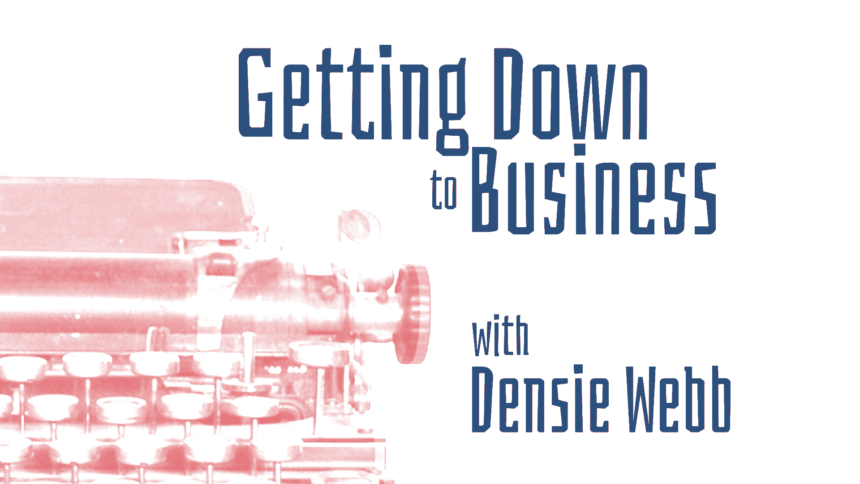Getting Down to Business
By Densie Webb | March 1, 2025 |

AI and book bans topped the news last month. Microsoft is offering cash to authors who grant permission to use their books to train AI, while calls for regulation and oversight of AI increase. Amazon is doing away with a way to download ebooks to Kindle. See if it affects you. If the Iowa legislature gets its way, don’t expect to read any sex scenes in books from Iowa libraries. In the what-goes-around-comes-around category, J.D. Vance’s bestseller, Hillbilly Elegy is now the target of some book bans. Meanwhile, a school in Ft. Campbell, Kentucky is removing books that mention slavery, civil rights movement or diversity, equity and inclusion. But maybe there’s hope. A school in Texas offer an interactive program to teach about censorship. Are shorter books the way of the future? The prestigious Booker Prize seems to think so. And there’s more. Read on.
AI
ElevenLabs Launches Publishing Platform for AI-Generated Audiobooks
UK publishers prepare to negotiate the AI copyright debate
Microsoft offers publishers $5,000 to train AI on their books (half goes to authors)
Amazon
Amazon changes the ability to download Kindle books
Book Bans
Hillbilly Elegy, by JD Vance now subject to book bans
14 Book Censorship Posts to Revisit
Bookstores
More on the rise of romance bookstores
UK-based World of Books, e-tailer of new and used books, plans aggressive US expansion
Libraries
Libraries and librarians support romance novels
Library in Texas creates interactive program to teach about censorship
Politics
A dramatic shift in the Endowment for the Arts grant requirements
Publishing
8 Independent publishers form new cooperative
A small UK-based press takes a chance and takes off
Are shorter books in? The Booker Prize nominees suggest the answer is “yes”
Would you accept a Microsoft payment of $2,500 to use your book to help train AI programs? No judgment here. Truly curious.










Thank you, Densie. Lots of good information here. To answer your question . . . No, I would not take Microsoft’s offer to use any of my books or stories for training AI. In the fall I was glad to see that Penguin amended their copyright wording on all its titles worldwide and across all its imprints to read: “No part of this book may be used or reproduced in any manner to train artificial intelligence technologies or systems.” According to The Bookseller, the new wording will appear on all its new titles and any reprinted old titles. https://www.pcmag.com/news/major-publisher-penguin-random-house-blocks-ai-training-on-its-books Penguin and other major publishers too now are setting a good example and raising the bar to protect copyright and a writers creativity. I’m in complete support and have added a similar statement on my newest release. Also, the Authors Guild offers a “Human Authored” certificate and seal for writers to let readers know that their book content was not AI-generated. I registered my work and have the seals now.
I bet a lot of authors will take that bait. We’re not making money out here.
Thanks for the long lists – I see a lot of great posts to read over breakfast. You make it easy to be up-to-date.
Especially with the AI initiatives – I personally wouldn’t allow MS to use my words to train their algorithms, but I salute them getting – and paying for – permission, and including authors and not just publishers.
Like Paula, above, I’m planning to update my books’ front matter to indicate no part of the book was written by AI or by following AI prompts…
The thought of having any input from mechanical systems beyond a spell check makes me itchy.
I HAVE, however, found at least one good use for the technology, suitable for writers of fiction:
https://liebjabberings.wordpress.com/2025/02/26/a-legitimate-ai-use-for-fiction-writers/
That is, as a hardworking assistant for tasks truly suitable for handling by computer.
Any time actual intelligence is required, I’ll go with human – I’m writing books now, not working on fusion – but I hope I never allow even my beloved AutoCrit to give me suggestions about writing.
The dividing line for me remains: could a human, though totally bored, do this job mechanically (counting adjectives, comparing text to a list of cliches, counting how many times every possible 4-word phrase happens in a scene…). If so, and there is a convenient way to let a program do the task, I’ll accept the service. But if it requires one bit of insight, it’s MY job.